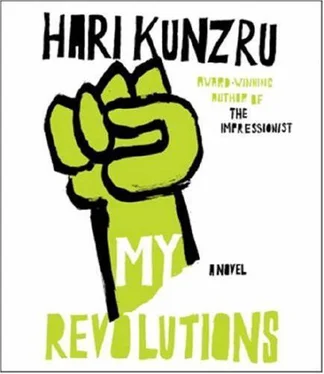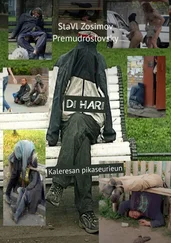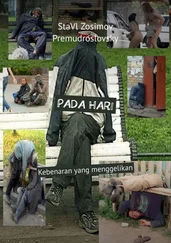Tensions between Sean and Saul got worse. Anna fanned the flames by spending the night after the Free Shop action with Sean, while Saul sat up late in the kitchen, drinking despondently with Jay Marks, an artist who was one of the long-term residents. Jay was an openly gay man, an unusual thing for those days. He sometimes worked with a street-theater troupe, performing political plays in tourist spots, all white-face and agit-prop slogans and cardboard planes. He and Saul had developed an uneasy friendship, based on banter about Saul’s discomfort with his homosexuality. As the level in the rum bottle dropped, their sarcastic jokes gradually flagged and Saul started to slump despairingly on Jay’s shoulder. Tentatively, Jay stroked his hair. I decided it was time to go to bed.
Everyone was in a bad mood the next day. Helen and Matthias were threatening to move out unless the door to the toilet was replaced. Jay was locked in his room. Over breakfast Saul called Anna a bitch and Anna called Saul a misogynist. Sean gave a smug lecture on possessiveness, playing to a captive audience in the kitchen, where we were trying to get ready for a demonstration at South Africa House. Anna threw a coffee mug at him, which smashed on the wall by his head. “Don’t you ever fucking act like you own me,” she warned. Anna’s rare displays of temper were shocking, not just because she was normally so controlled but because they didn’t appear to have a limit. When she was angry, it didn’t matter where she was or who was present. Context just disappeared.
Later that day, Sean suggested we rob the supermarket. Not shoplifting — a commando raid. Empty the place overnight, distribute a meal to every poor household in Notting Hill. Most people wanted to talk about apartheid, because of the demonstration (something
to do with cricket, I think), but Sean carried on, expounding his theme as we got on the bus with our placards, carrying on as we walked back through the park. Principle number one: if we wanted to call ourselves revolutionaries, we had to be prepared to break the law. This wasn’t just a gesture, or a bonding ritual. The experience of transgression was part of our formation as revolutionary subjects. It would change us, change our relationship to power. Principle number two: it was our food already. Deep down anyone who argued against stealing was motivated by guilt and fear, all the apparatus that had been installed in us by the ruling class for the purposes of social control. The truth of the situation was the exact opposite of the picture offered by the power structure. That food was the product of ordinary working people’s labor. It belonged to us already. They had stolen it from us .
It was directed at Saul, which worried me. A challenge. A dare. I think I called the idea adventurist. I remember Anna attacked me ferociously. “So that’s how it is? I had hopes of you. You say things like ‘The truly revolutionary line on such and such is such and such.’ But I think when it comes to actual revolution, you’ll hate it. You’ll hate the noise. You’ll hate the people. I think you’re a theorist .”
She’d hit on my weak spot, my secret fear. I don’t really know if Anna convinced me or just wore me down, but a few days later I found myself climbing into the back of Sean’s van. She and Sean were in front. Saul was next to me, nervously chewing his beard but determined not to back down, draft or no draft.
As would so often happen, Anna had taken on one of Sean’s projects, meticulously planning what we were about to do and transforming it from a piece of Errol-Flynnery into something like a military operation. We had a second vehicle, a Luton van usually used by Jay’s theater group. Jay had already gone ahead and was parked across the street from the supermarket. Someone had a friend who’d worked there stacking shelves. Around four, before the early-morning deliveries started, there would apparently be no one in the building. As far as he knew there wasn’t an alarm. We’d
climb the fence, force the doors to the loading bay, and drive the Luton van right in.
I’d taken a French blue and the world was pinned down. Sharp edges, hard clean light. I watched the others swarm over the high fence, using a bit of carpet to cross the tangle of barbed wire that ran along the top. Sean went first, carrying the bag of tools. Saul and Anna followed him, dropping down into the darkness of the yard.
It seemed to take them forever to cut the chain on the gates. I sat there with Rosa’s engine running, looking in the wing mirror to see if anyone was coming. At last the gates swung open. Jay backed the Luton van into the yard and reversed it into the loading bay. I followed him in and Sean closed the roller door behind us. The next few minutes were insane. We ran round the building like television prizewinners, pulling stuff off shelves and slinging it into the vans. We’d only brought two flashlights, so several people were always stumbling around in the dark. In the freezer room I grabbed chicken after chicken. Sean and Anna were chucking in sacks of potatoes, jars of coffee, whole pallets of canned vegetables. Soon enough we were back on the road, skidding northward up Ladbroke Grove toward Free Pictures. I was whooping and shouting, laughing like a maniac.
Anna’s true genius showed itself in the setup at Free Pictures. In the dank cinema, Uther, Matthias, Helen, and about ten others were ready with tape and cardboard boxes. We formed a human chain to get the stuff upstairs and by the time it was properly light, people across the area were waking up to find several days’ of groceries on their doorstep. In each box was a slip of paper:
After the revolution there will be enough for all.
It was a weird, apocalyptic summer. Things seemed to be collapsing: tower blocks, foreign governments. Sean and I went to a meeting of something called the London Irish Civil Rights Solidarity Campaign, where I heard new and ominous words: Bogside ,
Orangemen, B-Specials . Hoping for Paris, we traipsed up to Hornsey, where there was a sit-in at the art school. We found a lot of students discussing the meaning of design, eating in the canteen under a banner that read BUREAUCRACY mARES PARASITES OF US ALL. Other things were more fun. We disrupted property auctions by making false bids. A group of our friends dressed up in animal costumes and broke into the private gardens in the square opposite Free Pictures, opening them up as a playground for the local children. Just before he left for Sweden, Saul ran a training session at a local Vietnam Solidarity Campaign meeting. He’d been at the big Washington demos, the ones we’d seen pictures of, with people putting flowers in the barrels of guns and trying to levitate the Pentagon. He showed us various physical tactics, how to make yourself difficult to dislodge, how to “unarrest” someone without getting arrested yourself. He kept emphasizing the need for collective action. Nothing would work unless it was practiced by disciplined groups of people, who were aware of each other’s strengths and weaknesses, the level of risk they were individually prepared to take.
One night we got caught up in a violent bust at a basement bar off Westbourne Grove called the Island Breeze. We’d gone there to meet activists from a group called the African Liberation Caucus, a fancy name for a group of young men who gave out political leaflets outside the tube station and faced down the local mods. The ALC wanted to talk to us about the police. The Notting Hill force had always had a bad reputation, but now they seemed to be running amok. Black people were finding it impossible to drive a car down Ladbroke Grove after dark without getting pulled over. They were being beaten up in custody. Everyone agreed there was a problem; the trouble was that some of the ALC didn’t like involving whites in the issue. There was an ugly row, some name calling; we were about to leave when the police came charging down the stairs. No one resisted, but they smashed up the chairs and tables anyway, broke all the bottles behind the bar. Sean and I were held overnight, then released without charge. Everyone else had to go to court. A
Читать дальше












